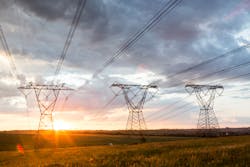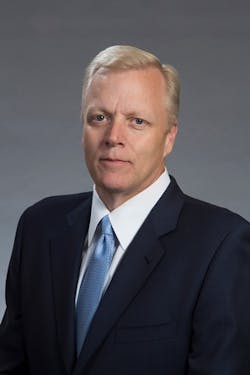Siemens Exec Weighs in on What Will Spur Grid Modernization
Executive Editor Karen Field sat down with Michael Carlson, president, Smart Grid NA at Siemens at the Bloomberg “Future of Resilient Design” conference in New York to talk about the state of grid modernization.
Field: Your career has focused on developing and applying advanced technologies to grid management for improved efficiency, reliability and performance. The evidence seems to be clear that these solutions can have a significant, positive impact on grid performance, so why do companies have such a challenge in making a case for it?
Carlson: When an asset is destroyed and there is no hope of recovering it, then it becomes a lot easier to replace it, especially on the equipment site. But swapping out any asset that is functioning as designed but could function better with new technology has always been a challenge for this industry. That is especially true when you get into the soft benefits of software and IT-based technologies that are not always easy to quantify. And there is always that risk of whether or not the new technology is going to provide that added bump, and this is an industry that is historically fairly risk averse. That is certainly true for a utility that operates as a monopoly that guarantees certain rates and returns.
Field: Is it at least, in part, a matter of education?
Carlson: Always. A lot of the advanced technologies are designed to prevent something from happening. But when that something happens--an outage, for example--you get a discrete measure of impact and the costs associated with it. But when you are talking about a technology that prevents something from happening, you have to use a model and models have assumptions, and assumptions are open to debate. So, we as technology providers have to do more to monitor and record the value of these solutions so as to inform the debate, and I think we are getting better at it.
Field: Is one challenge that these technologies are just more complicated, I mean when you talk about putting in a network that impacts the whole infrastructure, right?
Field: What else are you doing to encourage adoption of new technology?
Carlson: One of the things that we are doing in some cases is performance-based contracting, which is taking on total responsibility for the management of processes leading up to outcomes. It’s not a fit for everything in our portfolio, but I think that where it applies, it is putting added confidence in the project. But we are like any business, as soon as we take on the risk, we want the incremental return for more risk, and utilities are under this constant pressure of cost management.
Field: Can you give me an example of some of the new ways you are working with customers?
Carlson: We are doing more service-based contracts. For one utility, we manage the complete meter, coms, and data network for an AMI system. We took on the entire field operation, from installing that device to repairing it if it fails. We also manage all of the interconnectivity. There are other cases for which we either have components on the grid [or in an industrial environment], and we are paid to operate them on an x-cycle or x-kilowatts or x-hours basis. Not only do we guarantee that performance and manage the assets, but we also provide all the maintenance to support the product doing its job.
Field: It almost sounds like in this case you are operating as a utility?
Carlson: That is the interesting discussion we get into. While we do not operate as a utility, we do operate the equipment and guarantee the performance of it, and there is a fine line there. Our services business is growing and a big reason why is that we have a great history with utilities in executing on these performance-based contracts.
Field: So where is the industry today in its adoption cycle of new technology?
Carlson: Here in the U.S. if you are talking about a smart grid or distributed energy, we are still in the early stages, but I think that we are starting to see the heel of the hockey stick in the uptake of it. One thing to consider is the economics of this particular industry and the investment levels that are needed to completely update the grid. In some cases, utilities talk about 50-year assets! But we’ve only begun: What has happened in just the past five years probably represents the biggest change ever for the industry, and these new technologies will only continue to expand and proliferate over time.
About the Author
Karen Field
Group Content Director
Karen Field is Executive Director, Content for Penton’s new Internet of Things Initiative and IoT Emerge event. She has 25+ years experience developing content for an audience of technical and business professionals and a reputation for challenging conventional thinking and taking a novel approach in the creation of world class editorial and conference programming.
Most recently she launched the Internet of Things Summit at the Embedded Systems Conference and has covered the emerging issues associated with the Internet of Things extensively for EE Times, EDN, and Embedded.com.
Karen has a mechanical engineering degree and a master’s of business degree from the University of Minnesota and Boston University.

